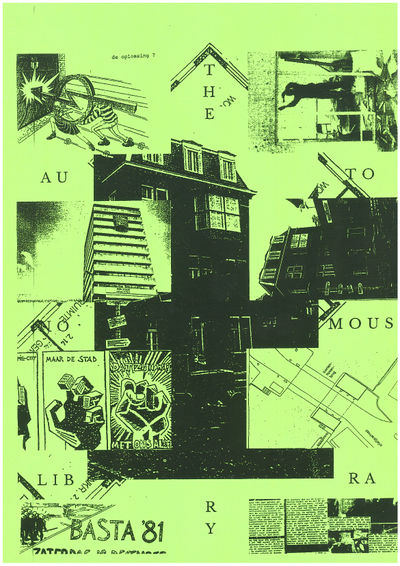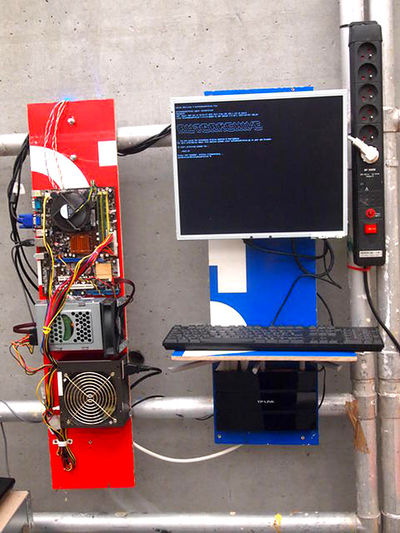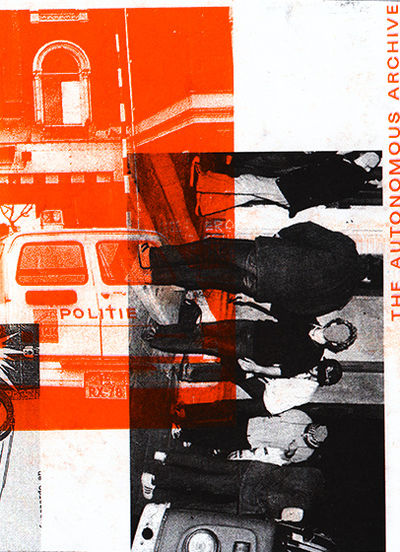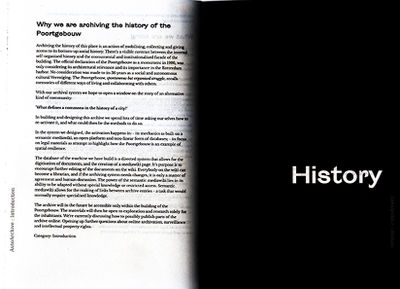Autonomous Archive: Difference between revisions
| (72 intermediate revisions by 10 users not shown) | |||
| Line 1: | Line 1: | ||
= | [[File:Print1.jpg|400px|right]] | ||
* | |||
** | =Special issue #4 = | ||
** | ==Schedule== | ||
** | * 23/10: Andre @PG: Populating the Archive (scanning); infrastructure | ||
* | * 30/10: Delphine | ||
* 6-7/11: Rosemary+Andre+Aymeric: Sprint to populate the archive | |||
* 11/11: Zinecamp | |||
* 13/11: [http://aaaan.net/ Annett Dekker]: [[Online Community Archives]] | |||
* 20/11: Andre: Algorithmic posters: [[Mediawiki API]], [[Imposition]] | |||
* 22/11: (Wednesday) [http://213.167.241.137/~mb/ Manetta Berends]: [[Wiki styling & social tools]] | |||
* 27/11: Delphine + Andre: merge material hand curated w/ algorithmic material | |||
* 4/12: Documenting publishing method/manual, based on book of Halfletter Press and this Special Issue | |||
* 7/12: Launch | |||
=Autonomous Archive= | |||
For the thematic project [[Interfacing_the_law|Interfacing the Law]], [[User:Giulla|Giulia Giovanelli]], [[User:Francg|Franc Gonzales]] and [[User:Eastwood|Max Franklin]] created the Autonomous Archive of historical living community Vereniging Poortgebouw based in Rotterdam. The aim of the project is to build a local "archive-machine", to encourage the collaborative collection of of materials that maps the legality of the Poortgebouw. | |||
[[File:Hni17-3 510.jpg|400px]] | |||
[[File:Aa3-web 406.jpg|400px]] | |||
[[File:Aa6-web_823.jpg|400px]] | |||
=[https://poortgebouw.org/ Poortgebouw]= | |||
[[File:Web-6_1390.jpg|500px|<ref name="franc">Image by [http://franc-g.com/Autonomous-Archive Franc G]</ref>]] | |||
<blockquote> | |||
“Het Poortgebouw” is the name of an extraordinary 19th century building, a national monument in Rotterdam’s Kop van Zuid district located on the south bank of the river Maas. | |||
Intended to house the head administrative office for Rotterdamsche Handelsvereniging, the building was completed in 1879 when the founder of the RHV, Lodewijk Pincoffs, went bankrupt and fled the country to the United States. In the following 120 years, the building would be adapted to fit the needs of the various users and the everchanging surroundings. This was amongst others the Holland America Lijn, a meteorlogic station, and for the longest time the Rotterdamse Havenbedrijf. After their relocation in 1978, the abandoned house almost become an Eros Centrum, if Rotterdammers had not protested emphatically against this municipal plan. | |||
Today, the name is equally connected to the collective of 30 inhabitants organised as members of an association (vereniging) established in 1982. 1984 marked the end of a long and bumpy road towards legalization, from an“action squat” (an organised protest against shortage of living spaces) on October 3, 1980 to the official rennovation of the place to meet the requirements of a (young) living group and the first –affordable– rent contract. | |||
Since then, the house has not only served residental needs but has also hosted social and cultural interaction and has provided a number of public “windows” into diverse non-profit oriented activities. The Poortgebouw is a living example that experiment, open-mindedness and a do-it-yourself attitude are the real engines of (sub)culture, not exploitative materialism and exhausting lobbying with bureaucracy. | |||
The majority of today’s international Poortgebouwers contribute to various realms of art and culture throughout Rotterdam, a creative energy which results in audible and visible productivity day and night at the Poortgebouw. Social, political and ecological consciousness underlie the overall climate. Our house “rules” are principally non-hierachical, built upon foundations of tolerance and peace, awareness of the needs of the other one and the freedom of thought and self-expression. To the “outside” the Poortgebouw has always offered an “open door” (and mind!). | |||
</blockquote><ref>https://poortgebouw.org/2016/10/19/the-short-story/</ref> | |||
= | =Development pages= | ||
== | ==hand-curated publication== | ||
[[ | [[Autonomous Archive/hand-curated]] | ||
==algorithmically curated publication== | |||
[[Autonomous Archive/algorithm]] | |||
=Pad hell= | =Pad hell= | ||
* | * 07-11-2017 https://pad.pzimediadesign.nl/p/special-issue-07-11-2017 | ||
* 06-11-2017 https://pad.pzimediadesign.nl/p/special-issue-06-11-2017 | |||
* 06-11-2017 taxonomy https://pad.pzimediadesign.nl/p/taxonomyarchive | |||
* 31-10-2017 https://pad.pzimediadesign.nl/p/special-issue-31-10-2017 | |||
* 30-10-2017 https://pad.pzimediadesign.nl/p/special-issue-30-10-2017 | |||
* 23-10-2017 https://pad.pzimediadesign.nl/p/23-10-2017 | |||
* 10-10-2017 https://pad.pzimediadesign.nl/p/special-issue-10-10-2017 | |||
* 09-10-2017 https://pad.pzimediadesign.nl/p/special-issue-09-10-2017 | |||
* 03-10-2017 https://pad.pzimediadesign.nl/p/special-issue-03-10-2017 | |||
* 2017-10-02 - https://pad.pzimediadesign.nl/p/specialissue-2017-10-02 | |||
* Wikis as publishing platforms - 18.09 - https://pad.pzimediadesign.nl/p/specialissue-2017-09-18 | |||
* The Automonomous Archive (Franc, Giulia, Max discussion) https://pad.pzimediadesign.nl/p/theautonomousarchive | * The Automonomous Archive (Franc, Giulia, Max discussion) https://pad.pzimediadesign.nl/p/theautonomousarchive | ||
* Project text for outreach https://pad.pzimediadesign.nl/p/blurb_PG_autonomous_archive | * Project text for outreach https://pad.pzimediadesign.nl/p/blurb_PG_autonomous_archive | ||
| Line 86: | Line 70: | ||
* List of interview questions https://pad.pzimediadesign.nl/p/questions_PG_autonomous_archive | * List of interview questions https://pad.pzimediadesign.nl/p/questions_PG_autonomous_archive | ||
<br> | <br> | ||
*Launch Ideas https://pad.pzimediadesign.nl/p/launch_ideas | |||
*workshop with MayDay Rooms: https://pad.pzimediadesign.nl/p/taxonomyarchive https://pad.pzimediadesign.nl/p/special-issue-06-11-2017 | |||
=Wiki wiki= | =Wiki wiki= | ||
* | * algorithmically curated publication: [[Autonomous Archive/algorithm]] | ||
* hand-curated publication: [[Autonomous Archive/hand-curated]] | |||
* [[Wiki_publishing]] | |||
* [[Index]] | |||
* [[List of external archives]] | * [[List of external archives]] | ||
* [[List of references]] | * [[List of references]] | ||
=References= | |||
<references /> | |||
[[Category: XPUB]] | [[Category: XPUB]] | ||
[[Category: Special Issue]] | [[Category: Special Issue]] | ||
=Launch Plan= | |||
*18:00 / 19:30 : Presentation Publication | |||
*19:30/ 20:00 : Dinner | |||
*20:00 / 22:00 : DJ Dennis | |||
*22:00 / 00:00 : dj Max and Ryan | |||
Latest revision as of 16:21, 27 November 2017
Special issue #4
Schedule
- 23/10: Andre @PG: Populating the Archive (scanning); infrastructure
- 30/10: Delphine
- 6-7/11: Rosemary+Andre+Aymeric: Sprint to populate the archive
- 11/11: Zinecamp
- 13/11: Annett Dekker: Online Community Archives
- 20/11: Andre: Algorithmic posters: Mediawiki API, Imposition
- 22/11: (Wednesday) Manetta Berends: Wiki styling & social tools
- 27/11: Delphine + Andre: merge material hand curated w/ algorithmic material
- 4/12: Documenting publishing method/manual, based on book of Halfletter Press and this Special Issue
- 7/12: Launch
Autonomous Archive
For the thematic project Interfacing the Law, Giulia Giovanelli, Franc Gonzales and Max Franklin created the Autonomous Archive of historical living community Vereniging Poortgebouw based in Rotterdam. The aim of the project is to build a local "archive-machine", to encourage the collaborative collection of of materials that maps the legality of the Poortgebouw.
Poortgebouw
“Het Poortgebouw” is the name of an extraordinary 19th century building, a national monument in Rotterdam’s Kop van Zuid district located on the south bank of the river Maas.
Intended to house the head administrative office for Rotterdamsche Handelsvereniging, the building was completed in 1879 when the founder of the RHV, Lodewijk Pincoffs, went bankrupt and fled the country to the United States. In the following 120 years, the building would be adapted to fit the needs of the various users and the everchanging surroundings. This was amongst others the Holland America Lijn, a meteorlogic station, and for the longest time the Rotterdamse Havenbedrijf. After their relocation in 1978, the abandoned house almost become an Eros Centrum, if Rotterdammers had not protested emphatically against this municipal plan.
Today, the name is equally connected to the collective of 30 inhabitants organised as members of an association (vereniging) established in 1982. 1984 marked the end of a long and bumpy road towards legalization, from an“action squat” (an organised protest against shortage of living spaces) on October 3, 1980 to the official rennovation of the place to meet the requirements of a (young) living group and the first –affordable– rent contract.
Since then, the house has not only served residental needs but has also hosted social and cultural interaction and has provided a number of public “windows” into diverse non-profit oriented activities. The Poortgebouw is a living example that experiment, open-mindedness and a do-it-yourself attitude are the real engines of (sub)culture, not exploitative materialism and exhausting lobbying with bureaucracy.
The majority of today’s international Poortgebouwers contribute to various realms of art and culture throughout Rotterdam, a creative energy which results in audible and visible productivity day and night at the Poortgebouw. Social, political and ecological consciousness underlie the overall climate. Our house “rules” are principally non-hierachical, built upon foundations of tolerance and peace, awareness of the needs of the other one and the freedom of thought and self-expression. To the “outside” the Poortgebouw has always offered an “open door” (and mind!).
Development pages
hand-curated publication
Autonomous Archive/hand-curated
algorithmically curated publication
Pad hell
- 07-11-2017 https://pad.pzimediadesign.nl/p/special-issue-07-11-2017
- 06-11-2017 https://pad.pzimediadesign.nl/p/special-issue-06-11-2017
- 06-11-2017 taxonomy https://pad.pzimediadesign.nl/p/taxonomyarchive
- 31-10-2017 https://pad.pzimediadesign.nl/p/special-issue-31-10-2017
- 30-10-2017 https://pad.pzimediadesign.nl/p/special-issue-30-10-2017
- 23-10-2017 https://pad.pzimediadesign.nl/p/23-10-2017
- 10-10-2017 https://pad.pzimediadesign.nl/p/special-issue-10-10-2017
- 09-10-2017 https://pad.pzimediadesign.nl/p/special-issue-09-10-2017
- 03-10-2017 https://pad.pzimediadesign.nl/p/special-issue-03-10-2017
- Wikis as publishing platforms - 18.09 - https://pad.pzimediadesign.nl/p/specialissue-2017-09-18
- The Automonomous Archive (Franc, Giulia, Max discussion) https://pad.pzimediadesign.nl/p/theautonomousarchive
- Project text for outreach https://pad.pzimediadesign.nl/p/blurb_PG_autonomous_archive
- Glossary
- List of possible interviews https://pad.pzimediadesign.nl/p/interviews_PG_autonomous_archive
- List of interview questions https://pad.pzimediadesign.nl/p/questions_PG_autonomous_archive
- Launch Ideas https://pad.pzimediadesign.nl/p/launch_ideas
- workshop with MayDay Rooms: https://pad.pzimediadesign.nl/p/taxonomyarchive https://pad.pzimediadesign.nl/p/special-issue-06-11-2017
Wiki wiki
- algorithmically curated publication: Autonomous Archive/algorithm
- hand-curated publication: Autonomous Archive/hand-curated
- Wiki_publishing
- Index
- List of external archives
- List of references
References
Launch Plan
- 18:00 / 19:30 : Presentation Publication
- 19:30/ 20:00 : Dinner
- 20:00 / 22:00 : DJ Dennis
- 22:00 / 00:00 : dj Max and Ryan





![[1]](/mw-mediadesign/images/thumb/c/cb/Web-6_1390.jpg/500px-Web-6_1390.jpg)